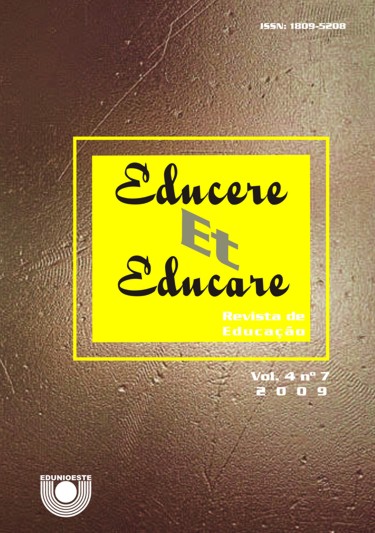A EDUCAÇÃO COMO CURA PARA A CORRUPÇÃO DO GÊNERO HUMANO NO PENSAMENTO DE COMENIUS
DOI:
https://doi.org/10.17648/educare.v4i7.1173Palabras clave:
Teologia, Educação, Moravianos, Ensino, Moral e piedade.Resumen
O pensamento de Comenius tem sido revisitado por meio de algunspesquisadores comenianos, preocupados em demonstrá-lo como pedagogo, sendo esta uma
das razões pelas quais é conhecido como o “Pai da pedagogia moderna”. Por outro lado, há
algumas poucas pesquisas que apontam Comenius como teólogo, enfantizando que ele não
foi apenas um pedagogo, mas sua atividade principal era a teologia. A partir desta
constatação, esta pesquisa objetivou demonstrar que só se pode compreender o conceito de
educação de Comenius, tendo como pressuposto fundamental a inter-relação da teologia
com a pedagogia, entre as quais Comenius não faz distinção. É somente com este
pressuposto que se compreende o motivo pelo qual Comenius destacou a educação,
fundamentada no ensino, moral e na piedade, como a salvação ou o remédio divino para a
cura da corrupção do gênero humano, haja vista que ela tem como finalidade última fazer
do homem um paraíso de delícias para o Criador.
Descargas
Publicado
03-12-2009
Cómo citar
LOPES, E. P. A EDUCAÇÃO COMO CURA PARA A CORRUPÇÃO DO GÊNERO HUMANO NO PENSAMENTO DE COMENIUS. Educere et Educare, [S. l.], v. 4, n. 7, p. p. 67–81, 2009. DOI: 10.17648/educare.v4i7.1173. Disponível em: https://e-revista.unioeste.br/index.php/educereeteducare/article/view/1173. Acesso em: 7 dic. 2025.
Número
Sección
Núcleo Temático: História, Sociedade e Educação
Licencia
Aviso de Direito Autoral Creative Commons
Política para Periódicos de Acesso Livre
Autores que publicam nesta revista concordam com os seguintes termos:
1. Autores mantém os direitos autorais e concedem à revista o direito de primeira publicação, com o trabalho simultaneamente licenciado sob a Licença Creative Commons Attribution que permite o compartilhamento do trabalho com reconhecimento da autoria e publicação inicial nesta revista.2. Autores têm autorização para assumir contratos adicionais separadamente, para distribuição não-exclusiva da versão do trabalho publicada nesta revista (ex.: publicar em repositório institucional ou como capítulo de livro), com reconhecimento de autoria e publicação inicial nesta revista.
3. Autores têm permissão e são estimulados a publicar e distribuir seu trabalho online (ex.: em repositórios institucionais ou na sua página pessoal) a qualquer ponto antes ou durante o processo editorial, já que isso pode gerar alterações produtivas, bem como aumentar o impacto e a citação do trabalho publicado (Veja O Efeito do Acesso Livre).
Licença Creative Commons
Esta obra está licenciada com uma Licença Creative Commons Atribuição-NãoComercial-CompartilhaIgual 4.0 Internacional, o que permite compartilhar, copiar, distribuir, exibir, reproduzir, a totalidade ou partes desde que não tenha objetivo comercial e sejam citados os autores e a fonte.


